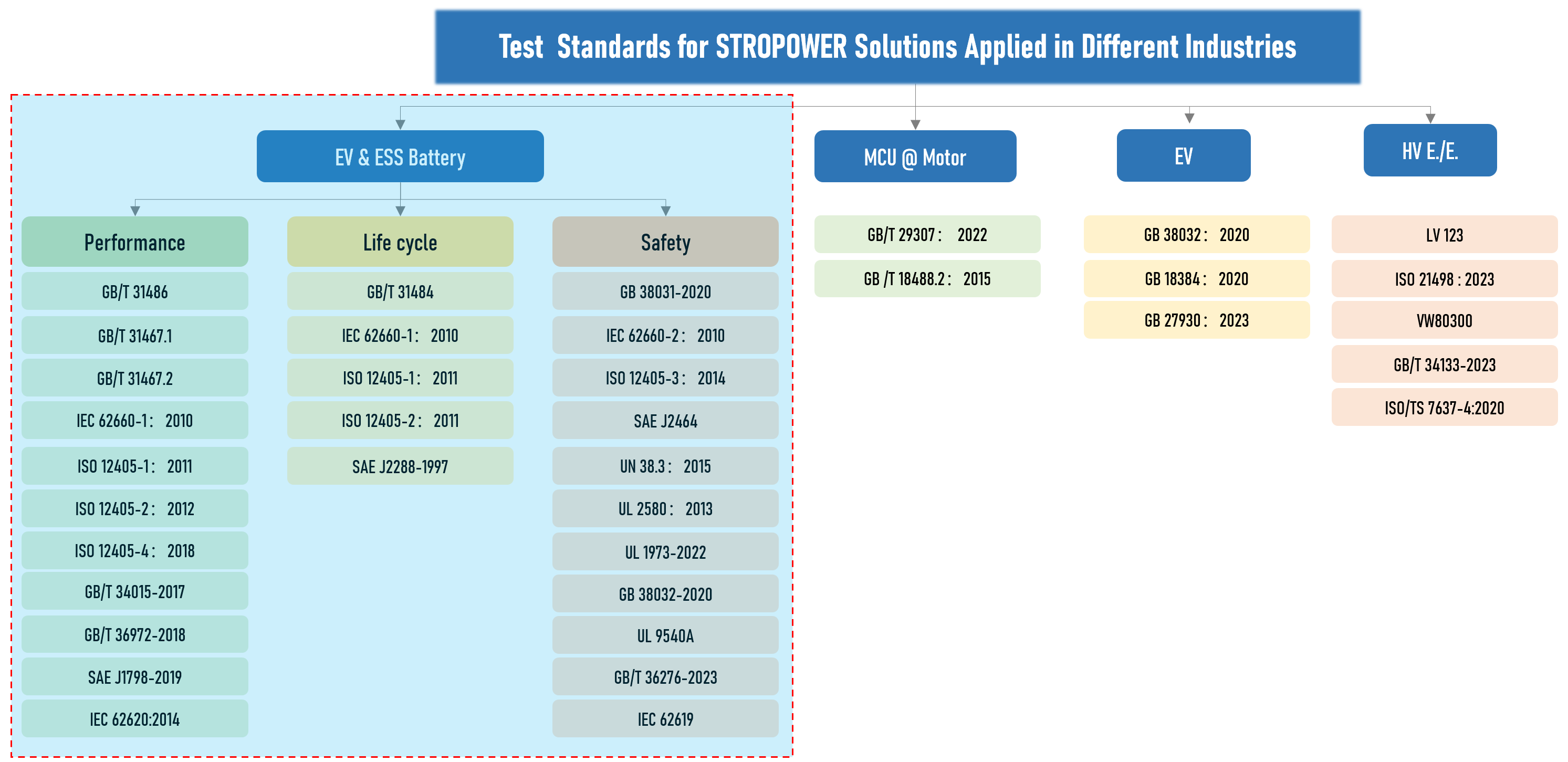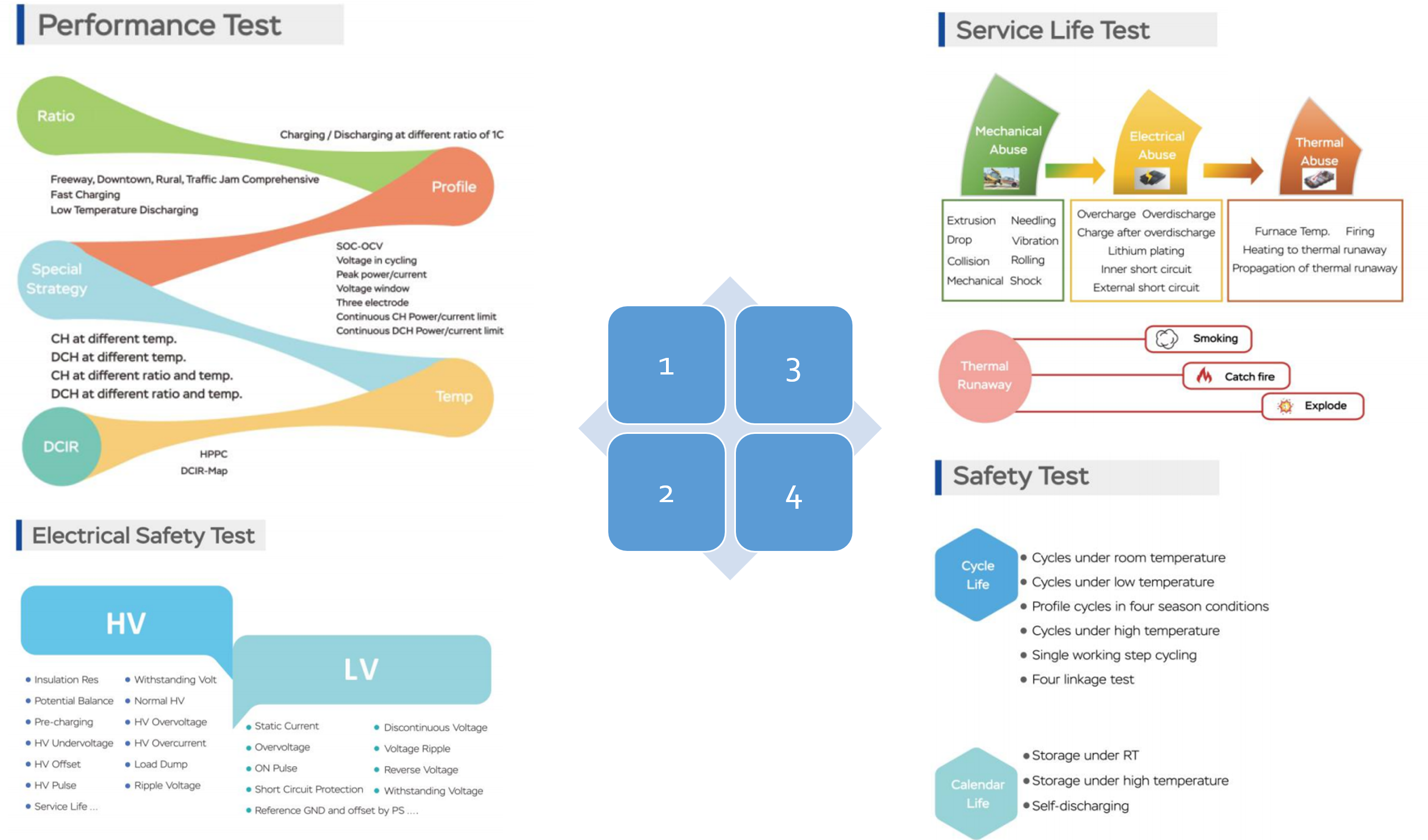General Compliance Tests
General Compliance Tests
Lithium - ion batteries are widely used in electric vehicles (EVs) and energy storage systems, Stropower battery cyclers and complete testing suite including installation and software services covering most of the compliance tests according to industry standards of China, Europe and USA.

Applications in EVs
- High - energy - density power supply: EVs require high - energy - density batteries to achieve long driving ranges. Lithium - ion batteries, such as those using nickel - manganese - cobalt oxide (NMC) or nickel - cobalt - aluminum oxide (NCA) chemistries, can provide the necessary energy density and specific power to propel vehicles over 100 - plus miles per charge.
- Fast - charging capability: The development of lithium - ion batteries has continuously improved their charging speed, reducing the time required for EVs to recharge. This enables EVs to be used more conveniently in daily life.
- Compact and lightweight design: Their compact and lightweight characteristics help optimize the layout and weight distribution of EVs, improving vehicle performance and handling.
Applications in Energy Storage
- Smoothing intermittent renewable energy: As renewable energy sources like solar and wind power are intermittent, lithium - ion batteries can store the excess energy generated during peak production times and release it during non - peak times. This helps balance the power grid and improve the stability and reliability of renewable energy.
- Backup power for power outages: In the case of power outages, lithium - ion battery - based energy storage systems can provide backup power to ensure the normal operation of critical equipment and systems, such as in data centers, hospitals, and telecommunications infrastructure.
Related Standards
- China
- Safety: The "Safety Requirements for Lithium - ion Batteries and Battery Packs for Portable Electronic Products" (GB 31241), "Technical Specification for the Safety of Lithium - ion Batteries and Battery Packs for Stationary Electronic Equipment" (GB 40165), and "Safety Requirements for Power Batteries for Electric Vehicles" (GB 38031) are mandatory standards that lithium - ion battery products must meet. They cover aspects such as preventing overcharging, short - circuiting, and over - discharging.
- Performance: For example, the "Energy - type Battery Energy Density ≥ 180Wh / kg, Battery Pack Energy Density ≥ 120Wh / kg; Power - type Battery Power Density ≥ 700W / kg, Battery Pack Power Density ≥ 500W / kg" requirements are specified. Different types of batteries have corresponding energy density and power density requirements.
- Cycling life: The cycling life of energy - storage - type batteries should be ≥ 5000 times with a capacity retention rate of ≥ 80%; that of power - type batteries should be ≥ 1000 times with a capacity retention rate of ≥ 80%.
- Europe
- Safety: The IEC / EN 63056: 2020 standard requires strict safety evaluations for energy - storage batteries under extreme conditions such as short - circuit, over - charge, over - discharge, high temperature, and low temperature to ensure that the batteries will not leak, explode, or pose other hazards.
- Performance: It requires that batteries meet specific performance requirements under normal operation and fault conditions. Testing services cover the measurement and evaluation of key performance parameters such as battery capacity, charge - discharge efficiency, and cycling life.
- Cycling life: Although there is no specific unified value, the cycling life requirements are included in the overall performance evaluation. The standard requires that batteries can maintain stable performance within a certain number of cycles to meet the needs of different application scenarios.
- USA
- Safety: For example, Underwriters Laboratories (UL) standards such as UL 1973 (for home energy storage) and UL 2743 (for portable batteries) are applicable. These standards cover safety requirements for various lithium - ion batteries, including preventing fire, explosion, and other hazards.
- Performance: There are relevant standards and regulations for the energy density, power density, and efficiency of lithium - ion batteries to ensure that they can meet the performance requirements of different application scenarios.
- Cycling life: Similar to Europe, there is no specific and unified numerical requirement, but it is an important evaluation index in battery performance tests. Battery manufacturers usually need to provide cycling life data based on specific application requirements to prove the reliability and durability of their products.
Related Tests per Compliance Requirement







